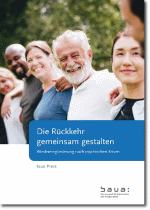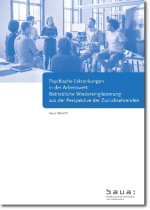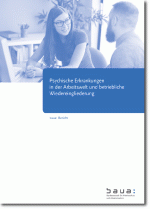What are the best ways of returning to work after a mental health crisis?
Mental disorders increase the risk of unemployment and early retirement. This makes it important for people recovering from mental health crises to be offered support when integrating back into the workplace. The Federal Institute for Occupational Safety and Health (Bundesanstalt für Arbeitsschutz und Arbeitsmedizin, BAuA) is currently conducting a number of research projects on the return to work (RTW) process.
For several years mental disorders have been among the conditions that cause the longest average periods of absence from work in Germany. While case numbers have risen marginally and have stabilised at a high level since 2011, there has been a steady increase in the amounts of time people take off on sick leave. This generates high direct costs in the healthcare sector and high indirect costs to the economy due to production downtimes and losses of labour productivity.
Mental health and illness in the world of work
Health promoting working conditions are important resources for employees’ mental health and workability.
Mental health means not just physical, mental, and social well-being, but also the ability to cope constructively with challenges, problems, and crises. It means not just the absence of disease, but a dynamic relationship between health and illness.
From this perspective, effectively managing or overcoming a mental health crisis and successfully returning to work are also expressions of mental health.
BAuA has been running its Mental Disorders in the Workplace project bundle for the last few years.
The results of the studies undertaken have formed the basis for the Institute’s recent publications. In particular, these include a best-practice guide to RTW after a mental health crisis and detailed fact sheets on operational integration management (OIM), gradual return to work (GRWT), interview techniques, self-efficacy, and psychosomatic consultations. It has also published a research report about a qualitative sub-study carried out as part of a mixed methods follow-up study on return to work, as well as several peer-reviewed articles about RTW that are available on our German Website.
Key aspects of RTW after a mental health crisis
One of the major challenges people face when they go back to work after a mental health crisis is the fear of stigmatisation. Stigmatisation and the fear of stigmatisation affect returning employees’
- confidence,
- goal orientation, and
- social interactions, and consequently
- their workability.
This is why it is important to talk openly about mental health, promote acceptance, and foster a trusting environment within a company. Training for managers, and education and awareness initiatives for colleagues are particularly helpful here.
What factors can influence the RTW process?
Apart from interpersonal relationships, there are many other factors that can influence the RTW process in different ways when employees have suffered mental disorders:
- the severity and, above all, duration of the disorder,
- the subjective RTW prognosis,
- the complexity of mental health crises,
- returning employees’ self-management and self-efficacy,
- the collaboration between the medical practitioners and therapists delivering treatment, the returning employees themselves, and key actors in the workplace,
- mentoring for returning employees,
- social support from superiors and colleagues,
- gradual return to work as a therapeutic intervention, and
- preventive and health promotion measures.
Linked-up individual and work-related interventions are particularly significant here. They include schemes that support returning employees’ self-management through feedback and coaching sessions with supervisors and RTW experts (RTW coaches, disability managers), as well as work design measures that protect returning employees from persistent overload and create space for new coping strategies. The aim is to facilitate healthier routines and make the employee’s return to work more sustainable. Gradual return to work is central to the arrangements for employees’ reintegration and the implementation of appropriate measures.
The therapeutic orientation of GRTW opens up the scope to find the perfect combination of individual, social, and organisational responses, through direct self-reflection, teamwork, and changes to working conditions.
Against this background, Project F 2459 is investigating current practical approaches to GRTW and is intended to tap into the expertise and experiential knowledge the key actors involved have acquired in this field.
Better-integrated prevention, early detection, and RTW: ongoing BAuA research projects
It is one of BAuA’s central concerns to gain a better understanding of prevention and reintegration measures in the coming years, and to trial and research new approaches within the psychiatric system at the interface between medical/therapeutic treatment and workplace prevention. In this wider context, BAuA is contributing to two research projects with third-party funding:
- RTW-PIA – Intensified Return to Work (RTW) aftercare in psychiatric outpatient clinics situated in care clinics
- friaa - Early Intervention at the Workplace - Provision for Companies and their Employees
The objective of these projects is to give people with mental health issues or disorders better treatment by improving the cooperation between hospitals, therapists, and central actors in the workplace, such as company physicians, OIM officers, and managers.






